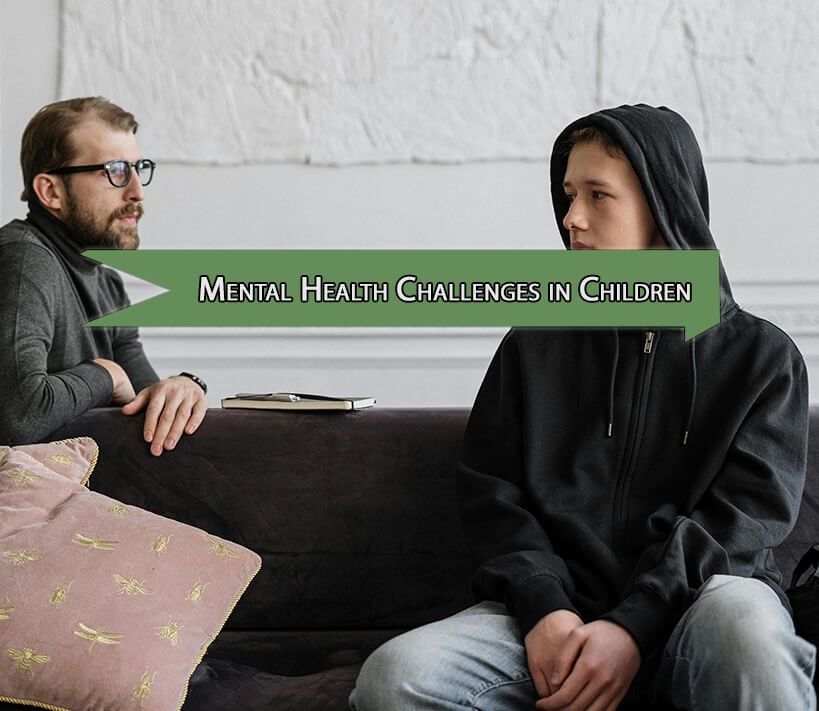Mental health is not just an issue for adults, children, too, are vulnerable to emotional and psychological struggles. From anxiety and fear to trauma and learning disorders, children face a range of mental health challenges that significantly shape their development and future well-being. Often, these issues go unnoticed, masked as mood swings, poor behavior, or academic underperformance. Understanding and responding to these signs early can make a transformative difference in a child life.
Below are some common mental health problems that children may experience, along with tips on recognizing them and knowing when to seek help.
1. Excessive Worry and Generalized Anxiety
It is natural for children to worry about school, friends, and their future. However, when these worries become persistent, irrational, or start interfering with daily life, they may be signs of Generalized Anxiety Disorder (GAD). Children with GAD often seek constant reassurance, frequently complain of stomachaches or headaches, experience sleep disturbances, and struggle to concentrate. Even minor setbacks can feel overwhelming to them. If left unaddressed, chronic anxiety can significantly hinder both academic performance and social development. At psychoaura, we emphasize early intervention and awareness to help children manage these challenges and lead emotionally healthier lives.
2. Separation Anxiety
It is common for toddlers to be clingy. Still, when the fear of being separated from parents continues into the school years and causes significant distress, it may indicate Separation Anxiety Disorder. Children with this disorder often have trouble sleeping alone, experience nightmares, and show extreme reluctance to go to school. This fear is rooted in anxiety that something bad might happen to them or their caregiver when they are apart. It disrupts family routines and affects the child ability to develop independence.
3. Social Anxiety and Fear of Judgment
Some kids are naturally shy, but Social Anxiety Disorder goes beyond simple bashfulness. Children with this condition fear embarrassment or negative judgments to the point where they avoid social interaction. Classroom presentations, group work, or even casual playdates can become sources of intense distress. This can lead to isolation, low self-esteem, and missed developmental milestones in communication and collaboration.
4. Learning Disabilities
Struggling with reading, writing, or solving math problems does not mean a child is not trying. Conditions like difficulty in reading known as dyslexia, challenges in math called dyscalculia, and motor coordination issues, referred to as dyspraxia, all fall under the umbrella of learning disabilities. Children facing these challenges often feel frustrated and embarrassed, which can lead to withdrawal and behavioral problems. With timely assessment, tailored teaching strategies, and emotional support, children with learning disabilities can excel uniquely.
5. Attention-Deficit Hyperactivity Disorder (ADHD)
ADHD is a neurodevelopmental disorder marked by difficulty paying attention, hyperactivity, and impulsive behavior. Children with ADHD may seem inattentive, forgetful, and easily distracted. They might blurt out answers in class, interrupt others, or have trouble sitting still. These behaviors are often misunderstood as defiance or laziness, but ADHD is a real medical condition that requires support, structure, and sometimes medication or therapy.
6. Phobias and Specific Fears
It is very common for children to go through phases of fear, such as believing there is a monster under the bed or being afraid of the dark. However, when these fears become intense, persistent, or start interfering with daily life, they may be classified as phobias. Specific phobias can feel overwhelming and isolating, whether it is a fear of heights, dogs, or water. Children may begin to avoid normal activities, refuse to go to certain places, or even experience panic attacks. Behavioral therapy can help children confront and manage these fears effectively.
Why Early Intervention Matters
Recognizing mental health issues early leads to better outcomes. When ignored, these issues can cause serious problems during adolescence and adulthood. Parents, teachers, and caregivers play a frontline role. If they notice persistent changes in a child mood, behavior, or performance, they should consult mental health professionals. We must treat mental health as equally important as physical health. Encourage open communication, reduce stigma, and create a nurturing environment so children feel empowered to express their feelings and seek help.
Conclusion
Mental Health Challenges in Children are a crucial concern for their overall well-being and development. While emotional ups and downs are a regular part of growing up, persistent struggles with anxiety, separation fears, learning challenges, or attention difficulties should not be overlooked. By recognizing the signs early and responding with compassion, awareness, and professional support, we can help children navigate these challenges and build resilience. Every child deserves to feel understood, supported, and empowered. At home, in school, and within the community, we must actively create an environment that prioritizes mental health support as much as physical health, because emotionally healthy children grow into emotionally strong adults.




